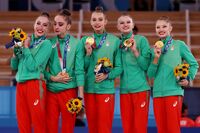The Highs and Lows of the 2020 Tokyo Olympics
What You Need To Know
The Tokyo Summer Olympic Games kick off on July 23, with more than 11,000 athletes flocking to the Japanese capital for a shot at glory.
But the road to the Games has been less than glorious after an unprecedented year-long delay, the biggest disruption since the 1944 London Olympics was canceled during World War II. For host Japan and the International Olympic Committee, the decision to press ahead with the event during a global pandemic drew controversy — and they will be closely watched to see if they manage to pull off a safe competition and stave off the risk of a virus superspreader event. Opinion polls showed a majority of Japanese people were against holding Games as the virus spread across the nation, though surveys later showed an uptick in support among a nervous public as the opening ceremony came closer.
The Games are likely to be a muted affair, with none of the usual pomp and revelry, and no fans watching from the stands. It’s the first to be held without spectators since the modern Olympic movement started in the late 19th century. Athletes and other participants will be in a quasi-bubble, largely cut off from interacting with the Japanese public. Outside the bubble, coronavirus infections are rising in Tokyo as the delta variant spreads. A delayed vaccination rollout has so far only covered most of the elderly in Japan.
Despite the IOC’s pages-long rules and protocols to avert infections, risks remain as Olympians live in close quarters. Two South African soccer players became the first athletes inside the Olympic Village to test positive for Covid-19 along with a video analyst for the team. A female U.S. gymnast tested positive while at a pre-Olympic training camp northeast of Tokyo.
Key Coverage
By The Numbers
- $15.4 billion Cost of the Tokyo Olympics, which includes around $3 billion extra for the delay
- $3.3 billion Amount of money raised from sponsors for the Tokyo Olympics, the most heavily sponsored sporting event ever
- 5.05 million Approximate number of tickets sold to overseas and domestic spectators. More than 95% will be refunded as most venues go without fans.
Why It Matters
The stakes are high for Japanese Prime Minister Yoshihide Suga, whose political fortunes are tied to the Games’ success as he and the ruling Liberal Democratic Party come under increased pressure over their handling of the virus. A general election needs to be held in Japan before late October, although a loophole could allow it to be postponed until November.
Japan will also attempt to demonstrate human resilience in the face of adversity. Tokyo Governor Yuriko Koike sees the Games becoming a “beacon of hope” for the world to find its way out of the pandemic. She also said the Games would celebrate diversity as the “most gender-balanced games in history.”
This year’s competition will also impact the Olympics business model. Businesses pay billions of dollars to get their brands and products in front of millions of ticket-holders, as well as 4 billion-plus TV and online viewers. The IOC needs to prove that the downsized and spectator-less event can still be an exciting draw for audiences, marketers and sponsors, who had to recalibrate plans after the event was delayed.
Separating the world’s realities from sport is a beautiful idea, yet they will always intrude. It’s time we embrace the intersection.
Timeline
-
3 years ago Technology at the 2022 Beijing Winter Olympics
-
3 years ago Fan-Free Olympics Showcase Socially Distant Tech










































